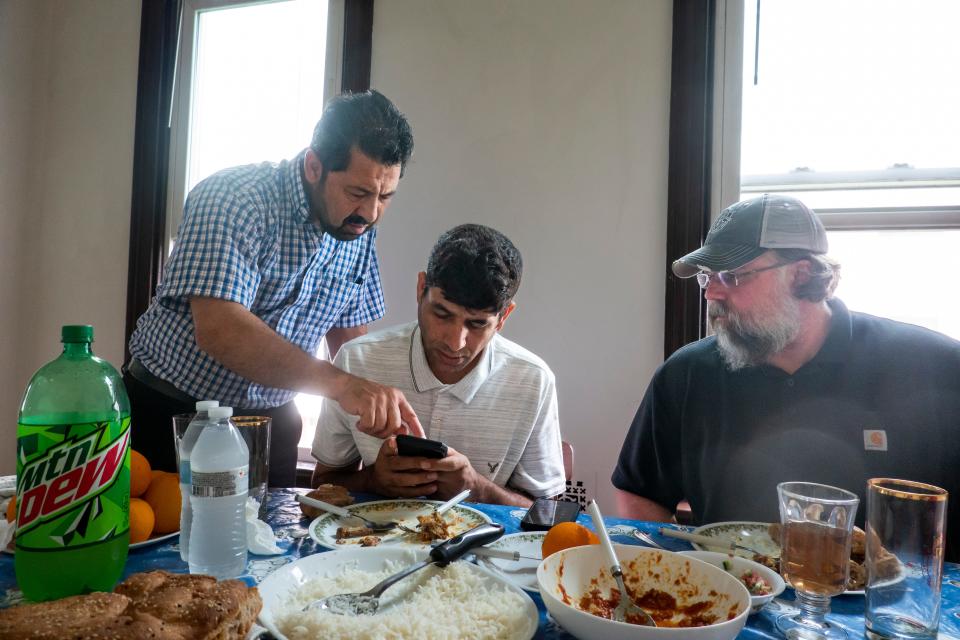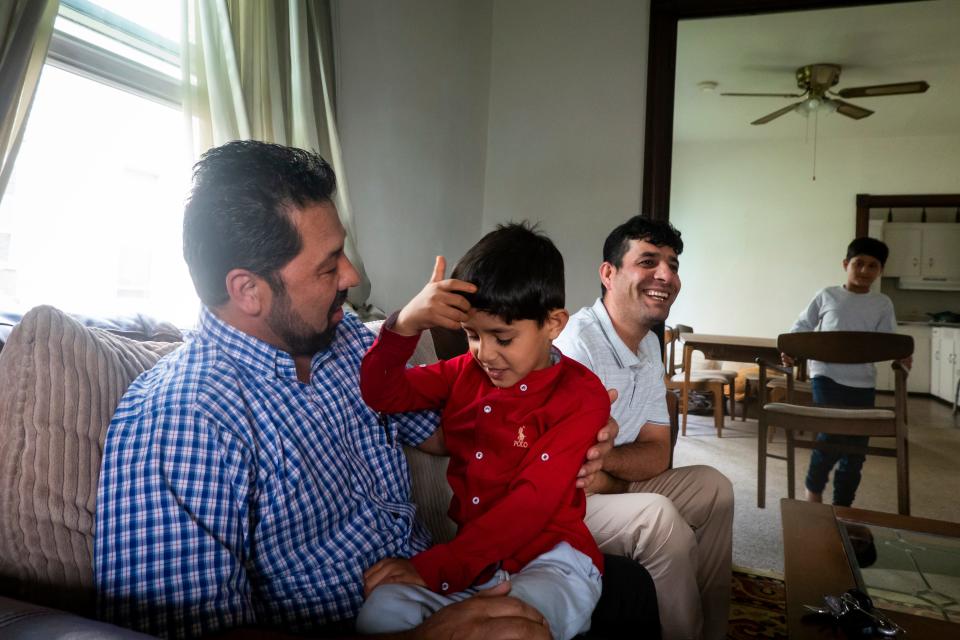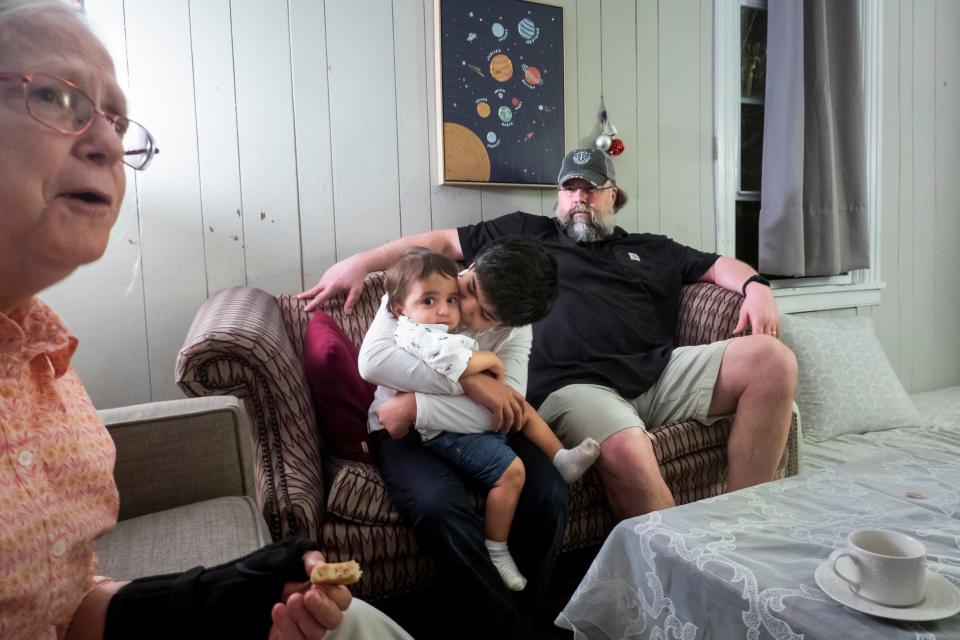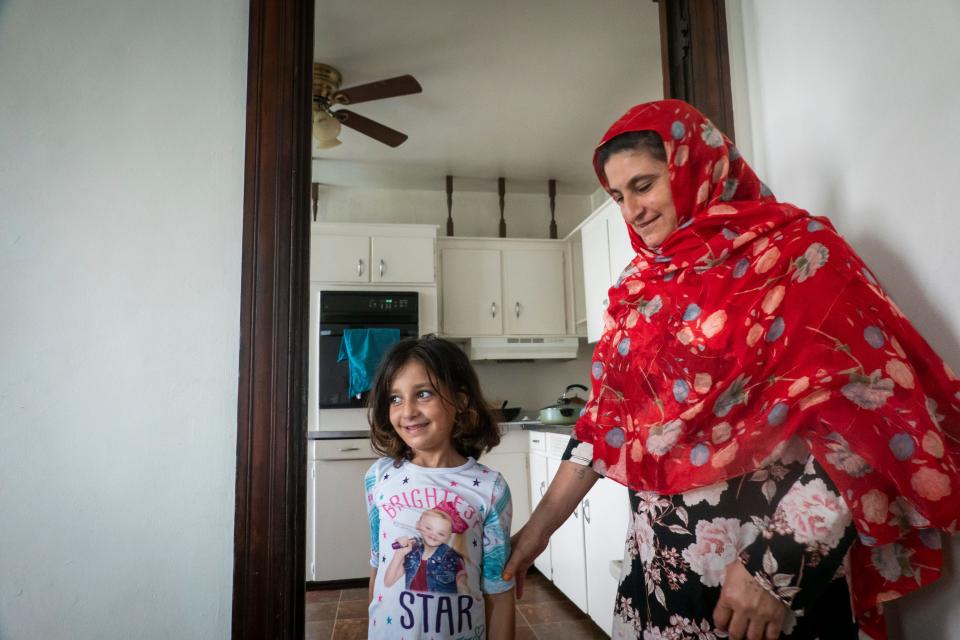After six deployments, he was ready to move on from the war in Afghanistan. It followed him to Pennsylvania.
MECHANICSBURG, Pa. – When Matt Coburn retired from the U.S. Army in spring 2021, after six deployments to Afghanistan, the Green Beret was ready to leave the war behind.
He was haunted by memories of friends being killed or maimed, and he was mentally exhausted by the military's bureaucracy.
He moved his family to this small town in south-central Pennsylvania, where he took a civilian job as a manager at an Amazon warehouse and promised his wife a more tranquil life.
But a year after the U.S. withdrawal, Afghanistan has come to him – and to his newly adopted hometown in Mechanicsburg, Pennsylvania.
The first to arrive was Azizullah Azizyar – a command sergeant major in the Afghan military who had worked closely with Coburn on special operations training. Reeling from the botched U.S. exit, Coburn agreed to sponsor Azizyar and his family, as he and other veterans frantically worked to help their Afghan friends escape.
Then came Pashtoon Peer Mohammad, another command sergeant major who escaped Kabul after hiding in the woods outside the capital for eight days. When he arrived at Fort Pickett, Peer Mohammad planned to move to Texas, where he'd lived while training at the U.S. Army Sergeant Major Academy.

But Azizyar persuaded Peer Mohammad to come to Pennsylvania instead. And Coburn signed up for another sponsorship. With Peer Mohammad came Basira Mohammadi, a master sergeant in the Afghan military who did not know anyone in the U.S. and who was Peer Mohammad's protege.
"There wasn’t anyone trustable outside of Azizyar and Pashtoon," Mohammadi said. "I decided to be with them."
More ex-Afghan officers came after her, drawn by each other and their American friend.
Now, this small town has an Afghan refugee community in the making, sprouted from far-flung friendships and nurtured by veterans, church volunteers and resettlement workers. Coburn says he has sponsored or helped about 10 newly arrived Afghan families who moved to Mechanicsburg and surrounding towns.
It has been both consuming and cathartic for Coburn, who like other veterans, was devastated by the horrific images of desperate Afghans trying to flee their homeland as the Taliban took power and U.S. prepared to leave. And it's been disorienting and difficult for the arriving refugees, who despite the warm welcome have struggled to get on their feet in a new country.
"You have to start from zero. You are nothing here," said Mohammadi, who was one of the first female non-commissioned officers in the Afghan army.
'What you were before, forget that'
Like thousands of other Afghans, Azizyar and his family fled Kabul with only a few belongings.
As the prospect of starting a new life sank in, Azizyar started to sink with it.
"I was thinking 'I’m not going to make it'," Azizyar recalled as he sat in the living room of his family's rental house in New Cumberland, about eight miles from Mechanicsburg.
He had no car, no job, and spoke only a few words of English. He had one friend: Coburn, who'd taken a leave from Amazon to help the Azizyars and other arriving Afghans find homes, get work permits, sign up for food assistance and health care.
One evening in November, Azizyar realized they didn't have enough bread for dinner, and the store was a two-mile walk. He decided to call the only other Afghan he knew in town, Mohammad Sadiq Alizada, who had come to the U.S. decades earlier and who had offered his help soon after the Azizyars first arrived.
Azizyar got a ride to the store – along with a lot of advice about how to make it in America as a refugee.
"What you were before, forget that," Alizada, 52, told him. "You have to start from scratch."
Alizada, who goes by "Mo," came to the U.S. in 1990, and eventually settled in New Cumberland. Before leaving Afghanistan, he was about to become a second lieutenant in the military. When he got to Pennsylvania, his first job was at a Jiffy Lube.

Now he runs a small business, the Casablanca Hookah Lounge, and he offered Azizyar a job as a cook, making kebabs and shawarma. Alizada also pushed him to interact with the customers, forcing him to practice English.
Azizyar needed the nudge.
"Slowly I got better," he said of his outlook on life here.
'Just an old church lady'
After spending four months at Fort Dix, Mirwais Amiri was told he and his family would be relocated to Lincoln, Nebraska.
“I don’t know anyone there,” Amiri thought to himself. And from what he'd heard, Nebraska was "a very cold place."
He called Coburn, who helped Amiri – another high-ranking officer in the Afghan National Army – get rerouted to Mechanicsburg with his wife and six children, as well as Amiri's sister and her family. His parents and three of his brothers have resettled in nearby Lancaster.
In Afghanistan, Amiri was once the go-to guy when foreign VIPs landed in Kabul, such as U.S. congressional delegations or European ministers. With his polished English, he would walk officials through demonstrations of Afghan special operations units in action. Those U.S.-trained Afghan commandos conducted a large percentage of high-risk military operations after 2014.
“We would have lost that war 10 years ago if it weren’t for guys like him," Coburn said of Amiri.
On Aug. 24, in the final days of the chaotic U.S. evacuation, Coburn had made a special plea to Pentagon leaders to help Amiri and other Afghan commandos escape.
"Gentlemen," he wrote in a text message to Major General Chris Donahue, who was on the ground at Hamid Karzai International Airport in Kabul, and General Austin Scott Miller, the last commander of the NATO mission in Afghanistan.
"We have highly loyal and dedicated Afghan Special Forces officers and (non-commissioned officers) at the SW Gate right now. They are with Sergeant Major Mirwais," Coburn wrote. "You know every one of these men. They have partnered with us loyally for years. They have earned the right for refuge and sanctuary ... Please, help us get them admitted to HKIA and flown out."
The military leadership did help Amiri escape; the others on Coburn's list did not make it out.
By the time the Amiris arrived in Mechanicsburg, local church groups had swung into action, and one woman in particular, a spry 76-year-old named Susan Smith, took the lead to find housing for the new refugees.
"She's basically been wearing down landlords all over this area. And then when she finally breaks them, she calls me," Coburn says. His job is to tout his status as a 24-year U.S. military veteran, trying to win over homeowners who might be reluctant to rent to newly arrived immigrants with no credit history and uncertain job prospects. Coburn is there to emphasize they have a support network.

In March, the Amiris signed a lease for a three-bedroom house in Mechanicsburg. In July, Smith and Coburn found a home right around the corner for Amiri's sister, brother-in-law and their four children.
"I'm just an old church lady," Smith said over tea and snacks in Amiri's living room. "This has been a great blessing," she said of the chance to help refugee families.
Amiri said the community has been welcoming, and with his kids about to restart school, he sees the possibility of building a good life here.
Still, it's been a tough adjustment, particularly for his wife who is isolated and far away from her family. "She’s telling me 'You brought me here'. I say 'There was no choice'."
Fighting back tears, he said it's been hard for him too. "I miss everything."
'I accept that my life has changed'
Mohammadi and Peer Mohammad initially moved in with the Azizyars, and like all the new refugees, they quickly began looking for work.
Mohammadi landed a job working at an auto supplier warehouse, Dayton Parts, operating a bagging machine. She found an apartment closer to the warehouse, so she didn't have to rely on Coburn to drive her to and from work.
Soon, she persuaded the others to apply. Now five of the Afghan refugees are employed there, working 12-hour shifts three days a week.
Most have second jobs. Azizyar still works as a cook at the hookah restaurant. Amiri works part-time at a small Mediterranean grocery store in a nearby strip mall. His brother-in-law works at a kebab restaurant just a few doors down. And Peer Mohammad works extra shifts at the warehouse.
Mohammadi, who is 25, has another plan: going back to college. She has a bachelor's degree from a university in Afghanistan but has asked Coburn about the possibility of continuing her education here, though she's not sure yet how she will pay for it.
"I accept that my life has changed," she said, but that doesn't mean she will give up her ambitions.
Before Kabul fell to the Taliban, she had never traveled outside of Afghanistan. Now, she can't imagine going back.
"It’s gone back 100 years or more," she said of her homeland, noting that as a woman, she would no longer be able to work.
The start of an American life
After Azizyar started earning enough money, he set his sights on buying a car.
"In America, you have to have a car," he told Coburn. Plus, he'd grown tired of the two-mile walk to the nearest Giant.
Alizada, his friend and boss at the hookah restaurant, helped him learn how to parallel park and taught him the U.S. rules of the road – far more regulated than in Kabul.
After passing the test, Azizyar bought a 2003 Honda Civic from Alizada for $1,500. Now he takes his family shopping every Monday – his day off – and they visit three stores, including a market where they can buy halal meat and an Indian grocery that has the spices and other items his wife Roqia needs to prepare Afghan meals.
Their three children attended summer school to improve their English and have made friends in the neighborhood. The eldest, 8-year-old Roheed, sometimes helps translate for his mother when Coburn is trying to help with a task.

Like all the others, Azizyar now earns enough to pay his own bills and to send money back to relatives in Afghanistan, where the economy is in freefall and starvation has hit crisis levels.
But the pleas for help from home weigh heavily on him. It's not just from immediate family members, who cannot work and are struggling to survive. He also gets calls every other night from his former enlisted soldiers, asking for $50, $100 – any amount to help them make it through another day.
Coburn gets those calls, too, and they've taken a toll on his mental health.
"It's kind of endless," he says. "Where do you draw the line?"
'A moral vacuum in Washington'
Coburn was initially working with Task Force Pineapple, a group started by U.S. veterans to help evacuate their Afghan allies. But a year later, he and other veterans feel betrayed by leaders in Washington, including the Pentagon and the White House.
"There's just been a moral vacuum inside of our Special Operations Command and then all the way up through our Department of Defense," he said. "They've left all of this burden on veterans and civilians."
He said Pentagon leaders initially sent positive signals about working with veterans to get their former Afghan partners out. Now, he thinks they were just buying time until firestorm died down. And the veteran community quickly ran out of money, as public attention shifted elsewhere.
"The biggest hit we took was Ukraine," he said. "That was when everything shifted."
Coburn got a momentary thrill earlier this month when President Joe Biden announced the U.S. drone strike that killed al-Qaida's top terrorist, Ayman al-Zawahri. In 2004, when Coburn was an Army captain, he'd participated in a raid targeting al-Zawahri. They didn't find him.
The boost from knowing the U.S. had finally killed al-Zawahri did not last.
"It's indicative if somebody who's been hiding for 21 years feels comfortable enough to like sun himself on a patio, to expose himself like that," Coburn said. It does not bode well for keeping Afghanistan from becoming a terrorist haven again, he said.
For now, he has gone back to work and tried to refocus on his own life, while still serving as an "anchor" for the Afghan community. He works nights at Amazon and reserves Saturdays for his own family.
Sundays are his "Afghan day." He doesn't have an official system but he tries to make sure he's checking in on each family to make sure they're doing okay and see if they need help.
For the most part, they've become pretty self sufficient, he says.
"They’ve all stuck together in a good way."
More:
'Egregiously mishandled' or inevitably 'messy'? What went wrong in US withdrawal from Afghanistan
‘Where we belong’: Bond forged in war brings Afghan commando's family to Pennsylvania
This article originally appeared on USA TODAY: Army veteran draws Afghan refugees to his Pennsylvania hometown

